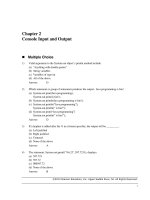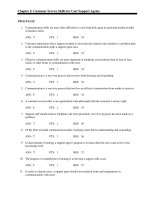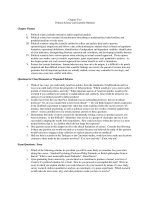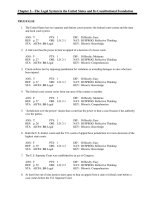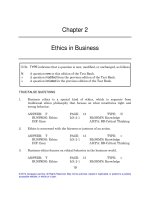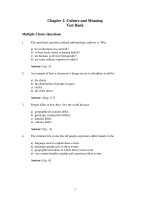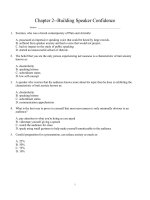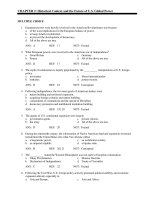Cengage advantage books analyzing politics 5th edition ellen grigsby test bank
Bạn đang xem bản rút gọn của tài liệu. Xem và tải ngay bản đầy đủ của tài liệu tại đây (130.64 KB, 4 trang )
Chapter Two
Political Science and Scientific Methods
Chapter Themes
I. Political science includes normative and/or empirical analysis.
II. Political science has consisted of practitioners subscribing to traditionalism, behavioralism, and
postbehavioralism over the years.
III. Political scientists using the scientific method to collect and analyze data tend to practice
epistemological empiricism and follow a data collection/analysis method which is based on hypothesis
formation, operational definitions, identification of independent and dependent variables, identification
of clear indicators, distinguishing between causation and correlation, and developing scientific theories.
IV. Political scientists have various options when selecting an actual research approach. These options
include case studies, survey research, experiments, quasi-experiments, and quantitative analysis. As
the chapter points out, each research approach has certain benefits as well as limitations.
V. Science has various limitations: human behavior may turn out to be unique; it is difficult to be purely
empirical and thus difficult to know that scientific findings are correct; the pursuit of science does not
guarantee that all important questions are actually studied; science may contradict its own logic; and
science may come into conflict with ethics.
Questions for Class Discussion or Organized Debates
1.
2.
3.
4.
5.
Think of two ways you could study American politics from the standpoint of traditionalism and two
ways you could study it from the perspective of behavioralism. Which would give you a more useful
portrait of American politics, and why? What important aspects of American politics would not be
revealed if you confined your analysis to traditionalism and, similarly, what would be missed in you
analysis if you limited yourself to hehavioralism?
Could it have been the case that Prof. Zimbardo was an outstanding professor, but not an ethical
professor? Or, do you consider him to have been ethical? ? Do you think Senator Coburn could point
to the Zimbardo experiment to support his claim that some academic fields (the social sciences, for
instance, that include psychology as well as political science) are less worthy of federal support than
others? Assess carefully how you would construct answers to these questions.
Demonstrate the limits of survey research by intentionally writing a survey to produce answers you
want to produce. Is this difficult? Administer your survey to a groups of classmates and see if you
succeeded in shaping the results form respondents. How could you have written the survey in a more
neutral fashion, that is, in a fashion which did not shape the responses?
One question raised in this chapter involves the ethical limitations of science. Consider the following:
Is there any question you would not study as a scientist because you believed the study of this question
would lead you to engage in data collection or analysis practices that are unethical?
Had you been a scientist in the Tuskegee or the Cincinnati studies, would you have made any decisions
contrary to those made by the scientists involved? If so, how and why? If not, why not?
Exam Questions: Essay
1.
2.
Which of the following scholars do you think you will be more likely to remember five years after
taking this course—Stanford Psychology Professor Philip Zimbardo or British philosopher Francis
Bacon? What is most memorable about Zimbardo? About Bacon?
Upon graduating from a university, you are hired as a consultant to produce a factual, overview of
Country X’s political situation for a client. How do you proceed to accomplish this task? Write an
essay in which you explain whether you would choose to do your research by means of a case study,
survey research, indirect quantitative analysis, an experiment, or a quasi-experiment. Which research
would make the most sense, why, and what problems would you have to resolve?
Exam Questions: Multiple Choice (correct answers are underlined)
1.
Political scientist A sets out to study a country by conducting research on its laws and institutions and hopes to
obtain normative insights on how to improve these laws and institutions. Political scientist B wants to study the
same country but focuses on collecting empirical data on the voting behavior of its citizens and has no interest in
including normative questions in her research project. Which of the following is true?
a. Political Scientist A is a traditionalist and Political Scientist B is a behavioralist
b. Political Scientist A is a behavioralist and Political Scientist B is a traditionalist.
c. Both Political Scientist A and B are behavioralists.
d. Both Political Scientist A and B are traditionalists.
2. When one compares the testimony of scientists at the Scopes trial of the 1920s and the creationism trials of the
1980s, one finds
a. the definition of science was unchanged
b. scientists enjoyed greater degrees of credibility/authority in the 1920s than in the 1980s.
c. both a and b
d. neither a nor b
3. Postbehavioralism argues that behavioralism is, in and of itself, a value statement.
a. true
b. false
4. The branch of philosophy that studies that which constitutes truth is known as
a. indicators
b. epistemology
c. operationalism
d. none of the above
5. A(n) _____________ is a definition so precise that it allows for empirical testing.
a. normative statement
b. b. correlation
c. operational definition
d. Baconian idol
6. A variable that is being affected is known as
a. an independent variable
b dependent variable
c. a causation variable
d. both a and b
7. Does the existence of correlation necessarily imply also the existence of causation?
a. yes
b. no
8. Studies of the U.S. civil rights process, which focused on an analysis of a single phenomenon such as the
passage of the Civil Rights Act of 1964, exemplified the use of
a. quantitative analysis.
b. a case study
c. survey research
d. both b a c
9. _______ generally provides greater breadth than a case study and produces findings which can be tested for
statistical significance
a. An experiment on an individual
b. A quasi-experiment on an individual
c. Survey research
d. none of the above
10. In survey research, patterns are always identical to groups.
a. true
b. false
11. A random sample is one in which
a.
12.
13.
14.
15.
16.
17.
18.
19.
20.
each person in the population to be studies has an equal change of being selected in the sample being
studied.
b. every person in the population to be studied is also included in the sample selected for study.
c. patterns but not groups are present.
d. sample members are asked closed questions.
A control group
a. is also known as a test group.
b. in an experiment is a group that is not exposed to a variable.
c. is also known as a Hawthorne Effect group.
d. both a and b.
If researchers conducting an experiment accidentally communicate their expectations about the experiment to
the subjects in the experiment, this is known as
a. the Rosenthal effect.
b. the double-blind effect.
c. the Hawthorne effect.
d. the variable effect.
Dr. Marion Sims
a. conducted medical experiments on slave women in the U.S. south prior to the Civil War
b. is regarded as one of the founders of gynecological medicine.
c. both a and b
d. neither a nor b
Thomas Kuhn’s work has suggested that
a. science has often tried to come up with exceptions to explain away inconvenient facts.
b. science has not used paradigms.
c. survey research is the best way of collecting data.
d. operational definitions are not useful when doing scientific research.
Patrick Caddell has suggested that negative campaign advertising is correlated with
a. lowering voter turnout in elections.
b. producing a high number of “don’t know” responses when conducting survey research.
c. resolving the Rosenthal effect.
d. increasing level of trust in government.
In the Tuskegee study,
a. subjects were exposed to radiation.
b. the effects of syphilis were observed.
c. the study was terminated by the researchers when penicillin was found to be an effective treatment for
syphilis.
d. both b an c.
Francis Bacon
a. opposed science and the scientific method as hostile to religion.
b. wrote of various idols from which science could free humanity.
c. both a and b.
d. neither a nor b.
In terms of survey research, which of the following is true?
a. The order of questions in a survey can affect how people answer the questions in a survey.
b. Low levels of information can affect survey responses.
c. both a and b.
d. neither a nor b
The Zimbardo study
a. Collected DNA samples from infants born in U.S. hospitals without parental knowledge or consent
b. was one in which some members of the study acted so aggressively toward others that the study was
terminated prior to its planned time for completion
c. is often cited by anti-war advocates to argue that human nature appears to be thoroughly peaceful and
lacking in impulses toward violence.
d. Was funded by the U.S. government and involved exposing cancer patients to high doses of radiation
Internet Projects
1.
2.
3.
Examine the Center for Science in the Public Interest at . Identify two examples of recent
campaigns/activities/publications in which this organization is trying to use scientific knowledge to serve the
public interest. Do you find the Center’s arguments convincing? Why or why not?
At , the American Association for the Advancement of Science provides news releases and
updates on a variety of scientific issues. Analyze two postings/press releases/new updates from this page. Do
these postings, press releases/or news updates raise any ethical questions about the scientific process or the
findings of science? Explain.
The American Political Science Association maintains an Internet page at . What kind of
information does the Association make available at this site? Discuss three findings about Political Science in
the U.S. that you can identify at apsanet.org
